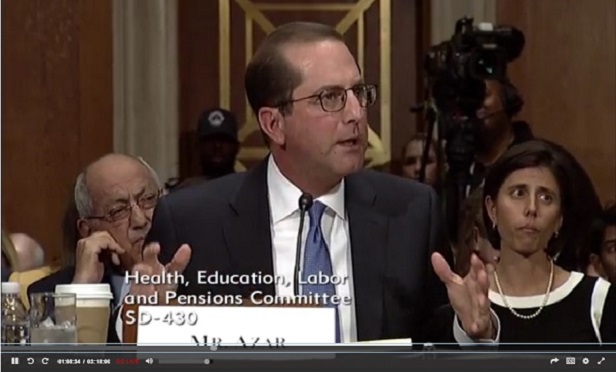
 Alex Azar (Photo: Senate HELP)
Alex Azar (Photo: Senate HELP)
President Donald Trump's administration proposed cutting what Medicare pays for many costly drugs for cancer and other conditions to match lower prices paid by European countries, whose governments more strictly control pharmaceutical costs.
Trump said he wanted to stop "global freeloading" by other governments through the proposed change to Medicare. The program covers more than 50 million elderly or disabled Americans and in 2015 paid for about a third of the $325 billion the U.S. spent on pharmaceuticals, according to the Kaiser Family Foundation.
"With the action I am unveiling today, the United States will finally begin to confront one of the most unfair practices," Trump said during a speech at the U.S. Department of Health and Human Services (HHS) headquarters in Washington. "I never understood: same company, same box, same pill, made in the exact same location, and you go to some countries it'll be 20% the price that we pay."
Medicare pays for drugs through two programs, Part B and Part D. Part D drugs are picked up at the pharmacy or through mail order, while Part B covers treatments administered by a doctor or in a hospital or clinic.
For physician-administered drugs, Medicare pays for the cost of the product, plus 6%. Critics have said the system creates incentives for doctors to prescribe more expensive therapies, and for drugmakers to raise prices.
Under the proposal released Thursday, Medicare would set payments for some drugs in Part B based on what would be known as an "International Pricing Index," more closely matching what the federal government pays to rates paid in other countries, where government policy makers more closely control prices. HHSsaid such a move would save the government $17.2 billion over five years.
Drug costs have become a major issue, and Trump is hammering the topic less than two weeks before midterm congressional elections. Democrats, who share many positions with the president on drug pricing, are attempting to make gains in congressional seats.
Trump has also made drug costs part of his focus on trade, saying that European countries have far lower prices and that U.S. consumers pays more as a result. A report released Thursday by HHS showed that Medicare, the U.S. health program for the elderly and disabled, pays almost twice as much for certain drugs as other countries with similar economies.
"The government pays whatever price the drug companies set without any negotiation," Trump said. "We are paying for, we are subsidizing it, everyone else is benefiting."
Many of the countries Trump referred to also have health care systems that dictate prices or negotiate directly with pharmaceutical companies — the type of single-payer arrangement that Trump and Republicans have repeatedly attacked.
HHS Secretary Alex Azar said that the administration will test the new pricing model in half the country to start, targeting drugs made by a single manufacturer. Over time, he said, the aim is to drive down the cost of those medications by 30%.
Azar said Medicare will not be fixing the price pharmaceutical companies will get paid, and that they'll have the choice raise prices abroad to make the U.S. index more favorable to them.



